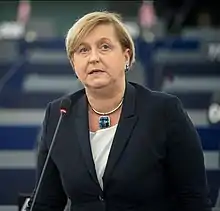Anna Fotyga
Anna Elżbieta Fotyga (pronounced [ˈanna fɔˈtɨɡa] (![]() listen); née Kawecka; born 12 January 1957 in Lębork) is a Polish politician who currently serves as a Member of the European Parliament, and is the Secretary-General of the European Conservatives and Reformists Party. She has served as Minister of Foreign Affairs of Poland, in the successive cabinets of Kazimierz Marcinkiewicz and Jarosław Kaczyński from (2006-2007) and Chief of the Chancellery of the President (2007-2008).
listen); née Kawecka; born 12 January 1957 in Lębork) is a Polish politician who currently serves as a Member of the European Parliament, and is the Secretary-General of the European Conservatives and Reformists Party. She has served as Minister of Foreign Affairs of Poland, in the successive cabinets of Kazimierz Marcinkiewicz and Jarosław Kaczyński from (2006-2007) and Chief of the Chancellery of the President (2007-2008).
Anna Fotyga | |
|---|---|
 | |
| Chair of the European Parliament Security and Defence Subcommittee | |
| Assumed office 7 July 2014 | |
| Preceded by | New position |
| Member of the European Parliament | |
| Assumed office 13 June 2004 | |
| Constituency | Poland |
| Chief of the Chancellery of the President | |
| In office 29 November 2007 – 20 August 2008 | |
| President | Lech Kaczyński |
| Preceded by | Robert Draba (acting) |
| Succeeded by | Piotr Kownacki |
| Minister of Foreign Affairs | |
| In office 9 May 2006 – 15 November 2007 | |
| Prime Minister | |
| Preceded by | Stefan Meller |
| Succeeded by | Radosław Sikorski |
| Personal details | |
| Born | Anna Elżbieta Fotyga 12 January 1957 Lębork, Poland |
| Nationality | Polish |
| Political party | Law and Justice ERC |
| Spouse(s) | Ryszard Fotyga |
| Children | 2 |
| Alma mater | |
| Signature |  |

Early life and education
Fotyga is a graduate of the University of Gdańsk and the Danish School of Public Administration. She also served postgraduate internships at the Department of Labor of the United States, Cornell University in New York and the European Bank for Reconstruction and Development.
Career
In 1981, and again after 1989, Fotyga acted as Head of the Foreign Office of the Solidarity headquarters in Gdańsk, and was a close associate of Lech Kaczyński. In 2000, Fotyga served as a foreign affairs adviser under then Prime Minister Jerzy Buzek. Subsequently, she was Deputy Chair of the Supervisory Board of Social Security Administration (Zakład Ubezpieczen Spolecznych, ZUS) with special expertise in International Labour Organization (Międzynarodowa Organizacja Pracy) and the World Bank. From 2002 to 2004, she was Deputy Mayor of Gdańsk.
Career in national politics
Fotyga garnered 25,994 votes (the second highest in the region) in the 2004 European parliamentary elections as a candidate of the Law and Justice (PiS) party in the Pomeranian Voivodship.
On 9 May 2006 Fotyga was appointed Minister of Foreign Affairs of the Republic of Poland by President Lech Kaczyński, replacing Stefan Meller. The opposition criticised her office for pursuing a policy of isolation in relation to Russia and Germany. On 7 September 2007, Fotyga was dismissed from her post but re-appointed again on the same day; in this way the prime minister and president avoided her being dismissed by a vote of censure prepared by the Civic Platform three months earlier.
Following the fall of the Kaczynski administration in 2007, she was succeeded by Radosław Sikorski as foreign minister of Poland.
Until 20 August 2008, Fotyga was the chief of the Office of the President of the Republic of Poland.
Member of the European Parliament, 2014–present
From 2014 until 2019, Fotyga served chair of the European Parliament Subcommittee on Security and Defence. She has since been a full member of both the Committee on Foreign Affairs and its Subcommittee on Security and Defence.
In 2015, news media reported that Fotyga was included in a Russian blacklist of prominent people from the European Union who are not allowed to enter the country.[1][2]
In 2020, Fotyga was appointed by NATO Secretary General Jens Stoltenberg to join a group of experts to support his work in a reflection process to further strengthen NATO's political dimension.[3]
Political positions
Fotyga's position on foreign affairs is congruent with the policy stance of PiS, based on the concept of Poland as a strong, independent country, poised to confront Germany or Russia when necessary. She has also pursued a policy of close alignment with the U.S.
On 23 November 2016 Fotyga proposed a resolution to counteract propaganda against the EU, which includes advocating censoring Russian media, such as RT and Sputnik.[4][5] The proposal came under criticism of European Federation of Journalists,[5] and Russian government.
Personal life
Fotyga is married and has two children.
References
- Laurence Norman (30 May 2015), Russia Produces Blacklist of EU People Banned From Entering Country The Wall Street Journal.
- European Union anger at Russian travel blacklist BBC News, 31 May 2015.
- Secretary General appoints group as part of NATO reflection process NATO, press release of 31 March 2020.
- "Tackling propaganda: "It's a continuation of methods used during the Cold War" | News | European Parliament". European Parliament. 22 November 2016. Retrieved 31 October 2019.
- "EU Parliament Resolution to tackle anti-EU Propaganda comes under criticism from journalists". European Federation of Journalists. 24 November 2016. Retrieved 31 October 2019.
